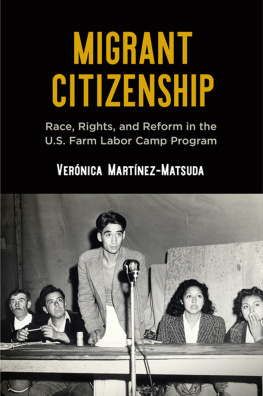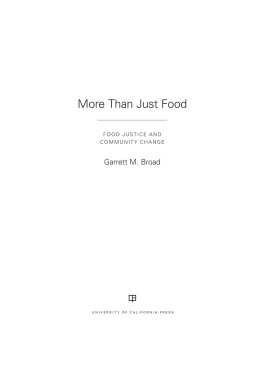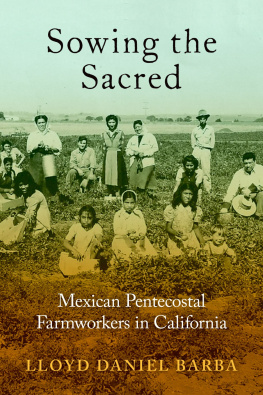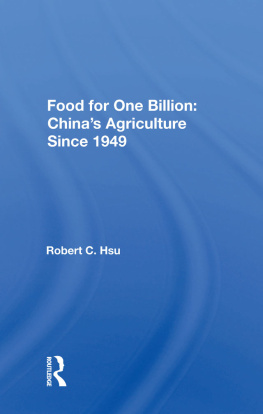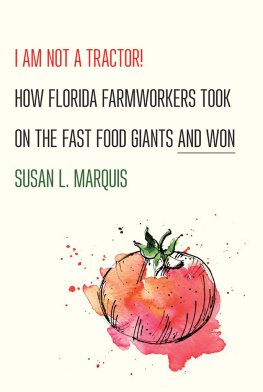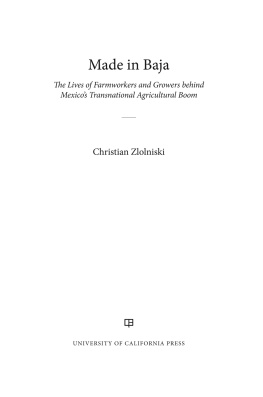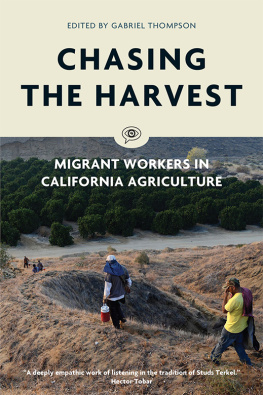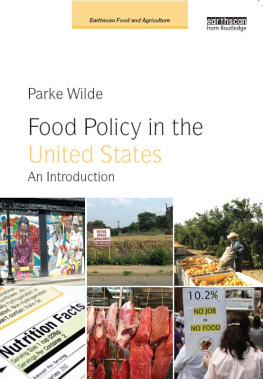Life on the Other Border
The publisher and the University of California Press Foundation gratefully acknowledge the generous support of the Anne G. Lipow Endowment Fund in Social Justice and Human Rights.
Life on the Other Border
FARMWORKERS AND FOOD JUSTICE IN VERMONT
Teresa M. Mares

UNIVERSITY OF CALIFORNIA PRESS
University of California Press, one of the most distinguished university presses in the United States, enriches lives around the world by advancing scholarship in the humanities, social sciences, and natural sciences. Its activities are supported by the UC Press Foundation and by philanthropic contributions from individuals and institutions. For more information, visit www.ucpress.edu.
University of California Press
Oakland, California
2019 by Teresa M. Mares
Earlier versions of material from the introduction appeared in The SAGE Encyclopedia of Food Issues, 2015 SAGE Publishing.
Earlier versions of material from the introduction, chapter 1, and chapter 3 appeared in Eating Far From Home: Latino/a Workers and Food Sovereignty in Rural Vermont, in Food Across Borders, edited by Matt Garcia, E. Melanie DuPuis, and Don Mitchell. 2017 Rutgers University Press.
Library of Congress Cataloging-in-Publication Data
Names: Mares, Teresa M., 1978- author.
Title: Life on the other border : farmworkers and food justice in Vermont / Teresa M. Mares.
Description: Oakland, California : University of California Press, [2019] | Includes bibliographical references and index. |
Identifiers: LCCN 2018040134 (print) | LCCN 2018044141 (ebook) | ISBN 9780520968394 (ebook) | ISBN 9780520295728 (cloth : alk. paper) | ISBN 9780520295735 (pbk. : alk. paper)
Subjects: LCSH : Dairy workersVermontSocial conditions. | Foreign workers, Latin AmericanVermontSocial conditions. | Agricultural laborers, ForeignVermontSocial conditions.
Classification: LCC HD 8039. D 32 (ebook) | LCC HD 8039. D 32 V 455 2019 (print) | DDC 331.6/280743dc23
LC record available at https://lccn.loc.gov/2018040134
Manufactured in the United States of America
28 27 26 25 24 23 22 21 20 19
10 9 8 7 6 5 4 3 2 1
This book is dedicated to my father David Mares and my daughter Evelyn. While the ends and beginnings of your lives did not intersect, I know that you would have loved each other deeply.
CONTENTS
TABLES AND ILLUSTRATIONS
MAP
TABLE
FIGURES
ACKNOWLEDGMENTS
As with any ethnographic endeavor, this book is the result of the collective and individual labor of dozens of people. First and foremost, I would like to thank the farmworkers who have shared their stories, experiences, and meals with me over the past seven years. Your resilience along La Otra Frontera has inspired me more than you could ever know. It is my hope that this book helps to make visible your struggles, your hopes, and your dreams. I came to Vermont knowing next to nothing about the dairy industry and the farmworkers who sustain it, and it is only because of your collective generosity and trust that I can now share your stories here.
To my colleague Naomi Wolcott-MacCausland: this book would have never been possible without your grounded guidance, support, and connections to the community. It has been an absolute honor to work with you as we have developed the Huertas project and as I have considered ways to piggyback my research on our gardening efforts. Your patience and commitment to others is astounding. Thanks also to the Huertas interns who have played double duty as research assistants for this project: Jessie Mazar, Claire Macon, and Elena Palermo. Your enthusiasm, energy, and commitment to social justice gives me hope that another world is indeed possible. You are the reason why I bring students into the field.
Thanks also to the many service providers and volunteers who sat down with me for interviews and shared the ways they support Vermonts farmworker community. Your assistance provided a vital dimension to this research, and your dedication to the well-being of others is deeply inspiring. In particular, Julia Doucet at The Open Door Clinic provided a much-needed space for me to do my research and form community connections.
In the early stages of developing this project and this book, I would have been lost without the support of my colleagues and mentors Amy Trubek and Luis Vivanco at the University of Vermont. You both campaigned for me way back in 2011, helped me to settle into life in Vermont, and have helped me at each critical juncture during my early academic career. Thank you for reading drafts of my book proposal and for championing my work for the last seven years. You have made UVM an intellectual home for me. Thank you also to all the members of UVMs Food Systems community who have been curious about and supportive of my research. Because of you all I never doubted the significance of this work.
The research underlying this book was supported at all stages by various departments and programs at the university. With funding support from the UVM Humanities Center, UVM Food Systems Planning Grant, The Graduate College REACH grant, the College of Arts and Sciences Joan Smith Faculty Research Award and Small Grants Program, and the Center for Research on Vermonts Frank M. Bryan Award, I gathered my data, hired my research assistants, and wrote this book. A junior leave and full-year sabbatical made this book a reality. I am incredibly fortunate to be employed by an university that supports the research efforts of its faculty in the ways that UVM does.
I owe a great debt to David Meek and Laura-Anne Minkoff-Zern who reviewed early drafts of the chapters for this book. To David in particular: this would have been an entirely different beast without your critical reading and excellent suggestions. Your feedback helped me to transform a rough assemblage of thoughts and arguments into a much more polished book.
To my dissertation advisors Rachel Chapman and Devon Pea, your guidance offered within the walls of Denny Hall continues to shape who I am as a researcher, writer, and teacher. You both provided me with a model for what an engaged decolonial academic should look like. I trust that you will read these pages and see your teachings intertwined with my words.
I am incredibly fortunate to have worked with the dynamic and supportive staff at the University of California Press to bring this book to fruition. To my editor Kate Marshall: I am thrilled beyond words that our initial conversations years ago have followed us to the publication of my first book. Your suggestions, questions, and attention to the nuances of publishing-while-pregnant are the reason that this book is being birthed at the time that it is. I look forward to many more years of working together. Bradley Depew, you were responsive and diligent beyond measure. You made the publishing process infinitely less intimidating and more transparent.
To Matt Garcia and Ellen Oxfeld, who provided in-depth readings of the full manuscript, your generous suggestions and questions were instrumental in bringing this project to its (tentative) conclusion. Thank you to Matt for also welcoming me into the Food Across Borders crew, where many of the seeds of this book were first planted.


